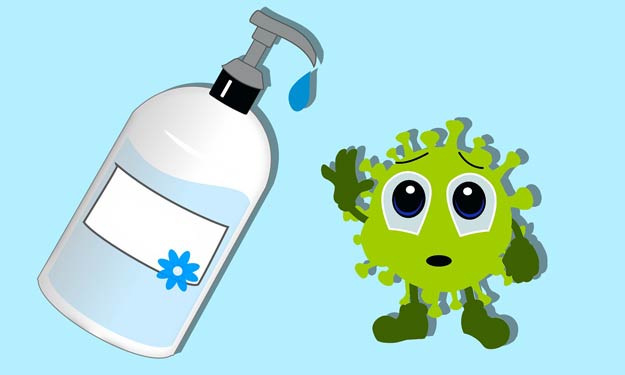Cleaning Tips for COVID-19
With the outbreak of COVID-19, it's important to clean and disinfect frequently touched surfaces and commonly used areas.
Although the risk of exposure is greater via person-to-person rather than touching surfaces, many are staying indoors and having items delivered. Even if you leave the house for quick trips to the store or must go to work (with all the preventative precautions), there could be a slight possibility of exposure, so correctly cleaning and disinfecting is critical to stay germ-free.
Cleaning Products to Use
For a complete list of recommended disinfectants, here is a full list of cleaners from the EPA—some items you may already have in the home. Many things are now available again in stores in limited quantities.
Some examples of cleaning products are:
- Arm & Hammer Disinfecting Wipes
- Barbicide
- Bleach Disinfecting Cleaners and Wipes
- Caviwipes
- Clorox Bleach, Wipes, and Sprays
- Comet Disinfecting Bathroom Cleaners
- Hydrogen Peroxide Cleaners
- Lysol Disinfecting Cleaning Products
- Scrubbing Bubbles Disinfecting Cleaners
- Soft Scrub with Bleach
How to Clean and Disinfect Surfaces
Cleaning and disinfecting surfaces may vary depending on the surface type. Again, cleaning the most commonly touched surfaces daily, not necessarily the whole house, is especially important unless you are inclined to do so.
If you have spare gloves, wear those and wash them (reusable) or dispose after use. If you have no gloves, wash your hands thoroughly after cleaning.
When cleaning and disinfecting surfaces, the EPA recommends allowing the surface or item to remain wet and dry naturally. This could take up to 10 minutes but will kill 99.9 percent of surface germs.
If necessary, vent the rooms you are cleaning. This will mainly depend on the product you are using.
Items that May Need Disinfecting Daily
These are some of the more important surfaces to disinfect daily, especially if many people are in the house.
- Light Switches
- Door Knobs
- Hand Rails
- Drawer Pulls
- Frequently Touched Cupboards and Cabinets
- All Counters (Kitchen, Bathroom, Laundry, etc.)
- Washing Machine and Dryer
- All Toilets
- All Faucets
- Kitchen Appliances (Refrigerator, Stove, Microwave, Toaster, etc.)
- Computer Keyboards, Computer Mice, Computer and Monitor Power Buttons, Printers
- Gaming Controllers, Gaming Consoles, Gaming Cases
- TV Remotes, Movie Cases, DVD Console
- Cell Phones, Tablets, and Other Frequently Used Electronic Devices
- Dining Room Table, Coffee Table, End Tables
- Bedroom Furniture that is Frequently Touched
Cleaning Hard Surfaces
Hard surfaces may consist of counters, drawer pulls, cabinets, switches, floors, etc.
To Clean Surface
Use soap or detergent and water. Cleaning with soap and water will first remove dirt and helps lessen the number of germs on the surface. Some toys may need a toothbrush to get in tiny crevices. After cleaning, move on to disinfecting.
To Disinfect Surface
After cleaning the surface, disinfect it with the recommended household disinfectant. Follow instructions for the type of surface you are cleaning. Allow the surface to remain wet and dry naturally.
Gently wipe over a toothbrush, toothpick, or Q-tip to get in crevices or tight areas.
Cleaning Electronic Equipment
Before COVID-19, we didn't think much about cleaning these highly touched surfaces, but now it's a different story. We cough, sneeze, and talk so close to these devices that now cleaning should be done daily.
Electronic equipment includes computers, keyboards, mice, gaming controls, tablets, cell phones, phones, laptops, and chargers.
If you are wiping down screens, use microfiber cloths to avoid scratching the surface. Do not use any corrosive cleaners, such as those that contain bleach.
To Clean and Disinfect Surfaces
Follow the manufacturer's recommended procedure for cleaning surfaces. Some items can be carefully wiped down with a rag dipped and wrung out of soap and water first, then cleaned with disinfecting wipes containing 70% alcohol.
If using any spray cleaners or disinfectant, spray the cloth first. Do not spray directly on the item to avoid any moisture damage.
Be sure your disinfecting method will not damage screens. Check manufacturers' recommendations.
Washing Laundry
This may include clothing, drapes, bedding, reusable grocery bags, etc.
Do not shake laundry out, wear gloves if someone has been sick, and wash laundry in the warmest water safe for your item.
Groceries and Other Shopping Items
When you leave a store, you most likely won't be able to wash your hands, so a sanitizer can work until you get home from the grocery store, home store, or big box store – then wash your hands before and after handling items.
Some products and packaging can be cleaned with hard surface cleaners, and vegetables and fruits can be rinsed and washed with soap and water for at least 20 seconds.
If packaging is not needed, be sure to dispose of these in recycling receptacles.
Getting Other Members of the House Involved
As stated, cleaning and disinfecting products are more readily available now than at the start of COVID-19. If possible, keep wipes close to high-touch areas. When the kids are done gaming, have them wipe down games and controls.
When done on the computer, wipe down the keyboard, mouse, etc.
Not only do these tips help around the house, but these tips can also be used to clean the car, your workspace, and so on.
Remember, no matter how clean you keep the house, wash your hands frequently, don't touch your face, sneeze, and cough in the crook of your arm.



